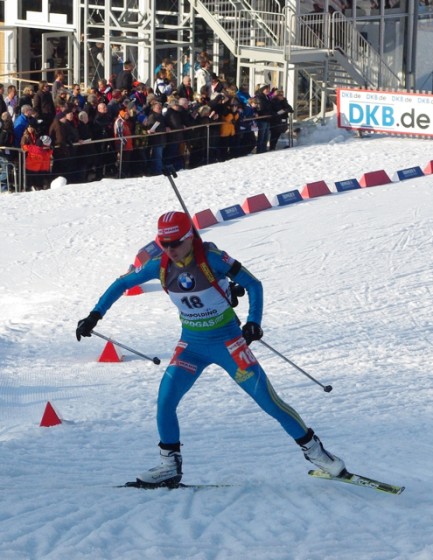
When the Tour de Ski swung through Oberhof a few days ago, quite a few skiers were unimpressed by the slush offered up on the German trails. But little did they know, they had a pretty good deal.
Conditions had seriously deteriorated by the time the women of the IBU World Cup got underway in their 4 x 6 k biathlon relay on Thursday evening. The tracks were every bit as cement-like and disgusting as they had been for the skiers, but there were new delights as well. Like fog. And mostly, rain.
“Right now it is Oberhofing pretty bad out,” American biathlete Susan Dunklee noted before the competition, which she did not race; the U.S. did not enter a team.
“It was hard to ski…it was so deep, I felt like I was running on the sand and the rain made it hard to see,” Germany’s Tina Bachmann said after the race.
And as the IBU’s own Jerry Kokesh noted in his writeup of the race, these were “not unusual Oberhof conditions this evening, with fog, light rain, and ever-softening tracks, making each step a struggle and staying dry impossible.”
Somehow, the women had to embrace this.
Not all did. Norway and Russia struggled notably, each requiring eleven spare rounds and still skiing three and two penalty loops respectively. Despite being among the pre-race favorites, neither team really figured in the race for first, and it was remarkable that they managed fourth- and fifth-place finishes.
The Czech Republic team got off to the best start, tagging off after the first leg with a 14-second advantage over Poland. Then Germany’s Miriam Gössner took off, seeming to delight in the conditions: she is tiny and quick on her feet, and not unlike Noway’s Therese Johaug. Gössner tore through the field, building up a large lead by the time she got to her second shooting stage.
There, the conditions caught up with her. Gössner missed three targets on her first attempt, and despite using her allotted three spare rounds, she could only knock down one of them. While the rest of the field hit the trails – many had used spare rounds as well – she dolefully headed to the penalty loop.
“I looked through the sight and just couldn’t see anything,” Gössner, who could be seen shaking her rifle to try to clear the sights in between loading spare bullets, told biathlon-online.de after the race. “You try really hard so that it’s possible to see something black.”
Despite losing a lot of ground and dropping to fifth place, the German’s quick skiing was able to put her back in second place by the time she tagged off to Franziska Hildebrand. By that time, Poland was in the lead.
But the third leg, too, was full of surprises. Polish racer Monika Hojnisz almost immediately fell on a downhill, and then struggled in the standing stage to remove her team from contention.
In fact, the downhills claimed many more racers. There were a number of painful-looking falls from even some of the best women, such as French scramble skier Marie Laure Brunet.
But the downhills were also a boon to the French. On the third leg, Sophie Boilley was one of the few women to slide the turns and skate aggressively out of them, rather than throwing a huge snowplow at the beginning and tottering her way through off-balance as most racers did. That helped her pass Hildebrand and put France in second place behind Ukraine, who had taken the lead.
“My fall did not help us today, but my friends were very good today,” Brunet said in the press conference. “Sometimes you are lucky and sometimes not, it is part of the game. I must congratulate my teammates on their work today.”
And in the final stage, things stayed the way they were. Vita Semerenko of Ukraine cleaned prone and used only one spare in standing, and kept her team’s lead at 45 seconds for a big win, their first of the season.
“Regardless of our lead, I felt a bit of pressure but I managed to control my nerves and bring a wonderful New Year present to my team,” Semerenko said.
Marie Dorin Habert shot even better than Semerenko, using not a single spare round, to extend France’s lead over Germany to a minute. Nadine Horchler used three spare rounds to keep her team on the podium.
After Norway and Russia crossed the line, Italy came through in sixth and Poland and Belarus rounded out the top eight.
Action continues tomorrow in Oberhof with the men’s relay; let’s hope for better weather.
Chelsea Little
Chelsea Little is FasterSkier's Editor-At-Large. A former racer at Ford Sayre, Dartmouth College and the Craftsbury Green Racing Project, she is a PhD candidate in aquatic ecology in the @Altermatt_lab at Eawag, the Swiss Federal Institute of Aquatic Science and Technology in Zurich, Switzerland. You can follow her on twitter @ChelskiLittle.



